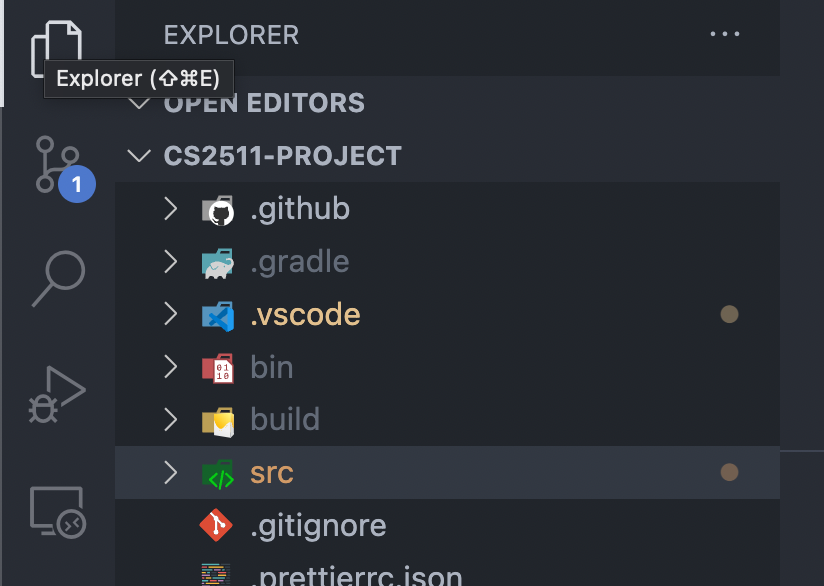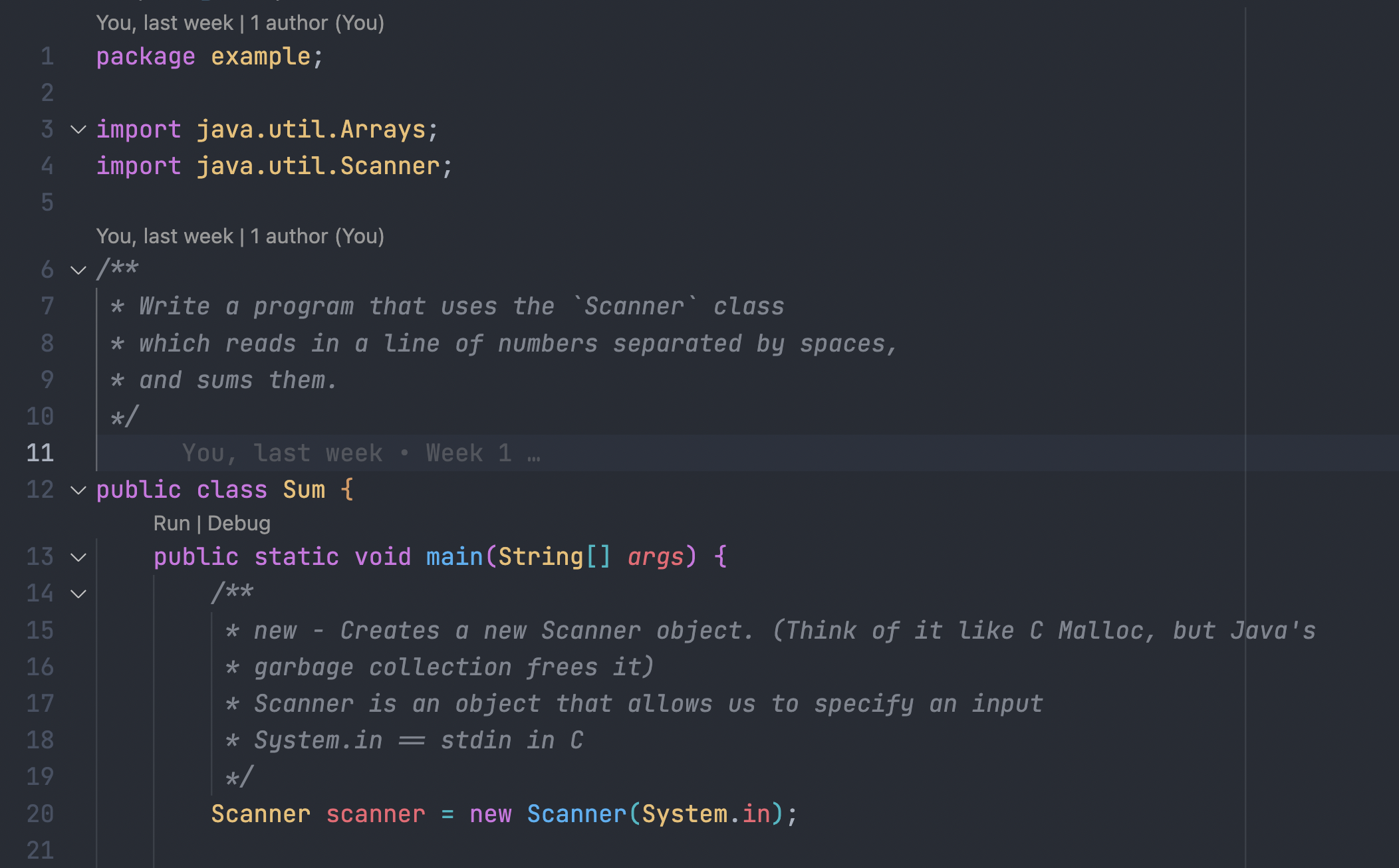COMP2511
23T2 Week 1
Wednesday 1PM - 4PM (W13A)
Thursday 3PM - 6PM (H15B)
Friday 2PM - 5PM (F14B)
Slides by Alvin Cherk (z5311001)
Today
- General Tutorial/Lab Introduction
- Java Syntax
- Object-Oriented Paradigm
Introduction
- My name is Alvin
- 4th Year Computer Science /
Mechatronicsstudent - I like mechanical keyboards, Destiny 2, Gundams.
-
Full Stack Developer
- Email: a.cherk@unsw.edu.au (Please try using the forums before emailing me, unless its for a personal reason)
- Include your zID somewhere so I can easily identify you
- I will usually take 24-48 hours at most to reply. If you don't get a reply, then send a follow up email.
- Prefix your email's title with 2511-[CLASSNAME] (e.g., 2511-F10A)
- Course email: cs2511@cse.unsw.edu.au
- Don't like how something is handled? You're welcome to escalate it to course admins. (Do talk to me first if possible).
How will it work?
- 1 Hour tutorial, 2 hour lab
- Tutorial: Tutorial questions that go over recent lecture topics
- Lab: Lab exercises & marking, general help, assignment check-ins/marking (later).
- Slides: https://slides.com/kuroson/decks/2511-23t2
- Repository: https://github.com/Kuroson/comp2511-23T2-tutorial
- Coursework: 15% (from your Course Outline)
- Lab exercises (Must be marked within 2 weeks of it being due)
- I.e., you cannot get lab01 marked off in week 10
- Lab exercises (Must be marked within 2 weeks of it being due)
My Suggestions
- Get to know the people in your tutorial. Make friends. You will be working in a pair for assignment 2/3 (optional for assignment 3).
- Make sure you are keeping up with lecture content
- Read your course outline. The course has changed!
- Plan out your term, COMP2511 can take up a lot of time!
- Please start assignments/projects early! (Looking at assignment 1)
- Ask lots of questions
- Prepare to learn how to read documentation & google on your own
Ice Breaker
- Name (and preferred name)
- Degree
- Favourite language & why
Or
Random interesting fact
Git
Git Revision
-
git add- Stage files
-
git commit- Commit the staged files as a snapshot
-
git push- Push your new commits to an online origin (GitLab, BitBucket, GitHub)
-
git status- State of current repository & branch
-
git log- History of current branch
Differences between Java, C, Python, JS/TS
- Syntax
- C, Java, JS/TS use
{and}to describe code blocks (also scopes) - Python uses whitespaces (tabs/indentations)
- C, Java, JS/TS use
- Classes:
- Java, Python, JS/TS support Object Oriented programming (OOP)
- Supports classes and inheritance
- C does not support classes. Closest things are pure 'data classes' called structs
- All code within Java needs to exist within a class
- JS/TS and Python can have runnable code outside classes
- Java, Python, JS/TS support Object Oriented programming (OOP)
Differences between Java, C, Python
- Types:
- Java, C and TypeScript are statically typed
- Python and JavaScript are dynamically typed
- Memory:
- C allows you to manually allocate memory
- Java, Python, JS/TS have automatic memory management
- Compilation
- C compiles into machine code
- Java and Python compiles into byte code, which is interpreted
- TypeScript transpiles to JavaScript which is then interpreted
VSCode Config Tips
Ensure that you open the correct folder
example: cs2511-project


Good
Bad
Name of folder open
The folder I want to actually open
VSCode Config Tips
Ensure you have the correct Java extension installed

VSCode Config Tips
Ensure that you are running code using the "Run" button

Always use this to run code in this course
Code Demo
HelloWorld.java
Code Demo
Make a simple Java program that prints "Hello World" in the HelloWorld class.
Code Demo
package example;
/**
* Prints "Hello World" to the console.
*/
public class HelloWorld {
public static void main(String[] args) {
// Does it need a \n?
// No, .println appends a \n to your string when it prints
System.out.println("Hello World");
}
}
Code Demo
Sum.java
Code Demo
Inside a new file called Sum.java, write a program that uses the Scanner class which reads in a line of numbers separated by spaces, and sums them.
package example;
import java.util.Arrays;
import java.util.Scanner;
/**
* Write a program that uses the `Scanner` class
* which reads in a line of numbers separated by spaces,
* and sums them.
*/
public class Sum {
public static void main(String[] args) {
/**
* new - Creates a new Scanner object. (Think of it like C Malloc, but Java's
* garbage collection frees it)
* Scanner is an object that allows us to specify an input
* System.in == stdin in C
*/
Scanner scanner = new Scanner(System.in);
/**
* Keeps reading input until it sees a \n
*
* Splits each string into an array of strings
*/
String[] numbers = scanner.nextLine().split(" ");
int sum = 0;
for (String number : numbers) {
sum += Integer.parseInt(number);
}
System.out.println("The sum is " + sum);
// Advanced
// Using streams
int streamSum = Arrays.asList(numbers).stream().mapToInt(x -> Integer.parseInt(x)).sum();
System.out.println(String.format("The sum is %d", streamSum));
/**
* Frees I/O resources
* Java's garbage collector only manages memory, not other resources
*/
scanner.close();
}
}
Code Demo
Loop.java
Code Demo
public class LoopExample {
public static void main(String[] args) {
String[] myStrings = { "Hello", "World", "No" };
// Index based looping
for (int i = 0; i < myStrings.length; i++) {
String current = myStrings[i];
System.out.println(current);
}
// For-range / for-in loop
for (String current : myStrings) { // Very python like
System.out.println(current);
}
}
}- Use the for-range loop unless you need access to index control
- You can use a index based loop if you need to change the value while looping over a collection of items
- Style marks will be lost in assignments if index loops are used when for-range loops could have been used
Why Classes?
Why do we use classes?
Ignoring OOP, Inheritance, Polymorphism, classes are useful for:
- Grouping "global variables" together
- Group relevant functions together
- Scoping of variables/functions
- Data hiding
Code Demo
Shouter.java
Code Demo
Inside a new file Shouter.java, Write a program that stores a message and has methods for getting the message, updating the message and printing it out in all caps. Write a main() method for testing this class.
package example;
public class Shouter {
private String message;
public Shouter(String message) {
this.message = message;
}
public String getMessage() {
// NOTE: You don't have to use the keyword `this`
// But I use it because of clarity
return this.message;
}
public void setMessage(String newMessage) {
this.message = newMessage;
}
public String toString() {
return String.format("Shouter message = %s", this.message);
}
public void printMe() {
System.out.println(this.message);
}
public void shout() {
System.out.println(this.message.toUpperCase());
}
public void printAndShout() {
// NOTE: You don't have to use the keyword `this`
// But I use it because of clarity
this.printMe();
this.shout();
}
public static void main(String[] args) {
Shouter s = new Shouter("This is my message");
s.printMe();
s.shout();
// When printing objects, Java will try and stringify
// In this case, it calls the .toString() method
System.out.println(s);
}
}
Feedback
